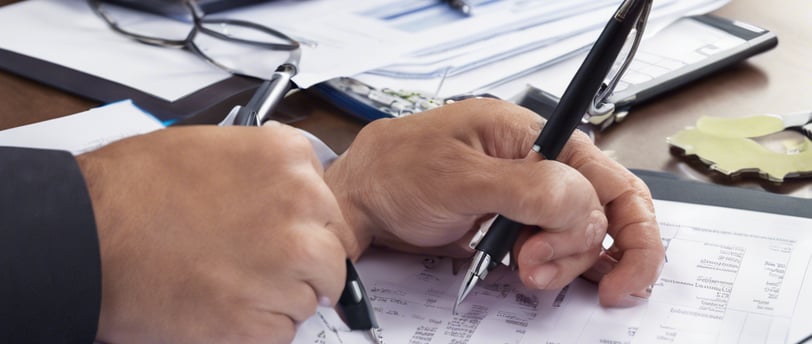What Business Records You Must Keep for HMRC (2025 Guide)
Learn which records HMRC requires you to keep, how long to keep them, and how to stay compliant as a UK business owner or freelancer. Avoid penalties easily.
Sanjima Akhter
5/22/20253 min read


What Records Do I Need to Keep for HMRC? A Complete Guide for UK Small Businesses
If you're self-employed or run a small business in the UK, keeping accurate records isn't just good practice—it’s a legal requirement. HM Revenue and Customs (HMRC) mandates that you maintain detailed records of your business transactions to ensure accurate tax reporting and compliance. Failing to do so can lead to penalties and complications during audits.(GOV.UK)
In this guide, we'll walk you through the essential records you need to keep, how long to retain them, and best practices for efficient record-keeping.
Why Record-Keeping Matters
Proper record-keeping serves several critical purposes:
Accurate Tax Returns: Ensures that your Self Assessment tax return reflects your true income and expenses.
HMRC Audits: Provides evidence to support your tax filings in case of an HMRC inquiry.
Financial Management: Helps you monitor your business's financial health and make informed decisions.
Legal Compliance: Meets HMRC's legal requirements, avoiding potential fines and penalties.(GOV.UK)
Essential Records to Keep
1. Income Records
Maintain comprehensive records of all income received, including:(My Tax Accountant)
Sales invoices issued to clients or customers.
Receipts for cash transactions.
Bank statements showing deposits.
Online payment platform statements (e.g., PayPal, Stripe).
2. Expense Records
Document all business-related expenses to claim allowable deductions:
Receipts and invoices for purchases.
Bank and credit card statements.
Mileage logs for business travel.
Utility bills and rent agreements.
Subscription and membership fees.(Low Incomes Tax Reform Group)
3. VAT Records (If Registered)
If your business is VAT-registered, you must keep:
VAT invoices issued and received.
VAT account detailing all VAT transactions.
Records of imports and exports.(My Tax Accountant)
Under HMRC's Making Tax Digital (MTD) initiative, VAT records must be maintained digitally using MTD-compatible software.
4. PAYE Records (If You Employ Staff)
For businesses with employees, retain:(My Tax Accountant)
Payroll records, including payslips and P60s.
Records of tax code changes and benefits provided.
National Insurance contributions and deductions.(My Tax Accountant)
These records should be kept for at least three years after the end of the tax year to which they relate. (My Tax Accountant)
5. Capital Assets
Keep detailed records of capital assets purchased for your business, such as:(schoolgateaccounting.com)
Machinery and equipment.
Vehicles used for business purposes.
Property or real estate investments.(schoolgateaccounting.com)
These records are necessary for calculating capital allowances and determining VAT treatment. (schoolgateaccounting.com)
6. Grants and Financial Support
If you received financial support, such as the Self-Employment Income Support Scheme (SEISS), retain:(GOV.UK)
Correspondence from HMRC regarding grant payments.
Bank statements showing receipt of funds.
Records of how the funds were utilized.
How Long Should You Keep These Records?
The duration for retaining records depends on the type of document:
General Business Records: Keep for at least 5 years after the 31 January submission deadline of the relevant tax year. For example, if you submitted your 2022 to 2023 tax return by 31 January 2024, retain records until at least the end of January 2029. (GOV.UK)
VAT Records: Maintain for at least 6 years, in line with digital record-keeping requirements under Making Tax Digital. (My Tax Accountant)
PAYE Records: Retain for at least 3 years after the end of the tax year to which they relate. (My Tax Accountant)
Capital Assets: Keep records for the duration of the asset's useful life and for at least 6 years after disposal.(schoolgateaccounting.com)
Grants and Financial Support: Retain records for at least 6 years after the end of the tax year in which the grant was received.
Best Practices for Efficient Record-Keeping
Digital Tools: Utilize accounting software like QuickBooks, Xero, or FreeAgent to automate record-keeping and ensure compliance with MTD.
Regular Updates: Schedule weekly or monthly sessions to update and reconcile your records.
Organized Storage: Store records in clearly labeled folders, both digitally and physically, for easy retrieval.
Backup Data: Regularly back up digital records to prevent data loss.
Seek Professional Advice: Consult with an accountant or tax professional to ensure your records meet HMRC's requirements and to optimize your tax position.
Conclusion
Maintaining accurate and organized records is crucial for the smooth operation of your business and for staying compliant with HMRC regulations.
Services
Expert financial management for your business needs.
Contact
About
+441234567890
© 2024. All rights reserved.
